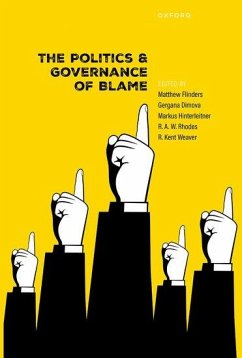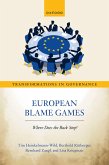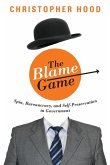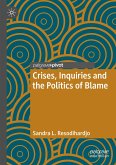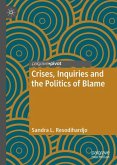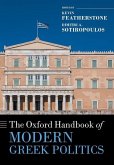Matthew Flinders, Gergana Dimova, Markus Hinterleitner, R A W Rhodes, R Kent Weaver
The Politics and Governance of Blame
Matthew Flinders, Gergana Dimova, Markus Hinterleitner, R A W Rhodes, R Kent Weaver
The Politics and Governance of Blame
- Gebundenes Buch
- Merkliste
- Auf die Merkliste
- Bewerten Bewerten
- Teilen
- Produkt teilen
- Produkterinnerung
- Produkterinnerung
With contributions from the world's leading scholars and emerging research leaders, this volume develops the theoretical, disciplinary, empirical, and normative boundaries of blame-based analyses.
Andere Kunden interessierten sich auch für
![European Blame Games European Blame Games]() Tim Heinkelmann-WildEuropean Blame Games126,99 €
Tim Heinkelmann-WildEuropean Blame Games126,99 €![The Blame Game The Blame Game]() Christopher HoodThe Blame Game25,99 €
Christopher HoodThe Blame Game25,99 €![Crises, Inquiries and the Politics of Blame Crises, Inquiries and the Politics of Blame]() Sandra L. ResodihardjoCrises, Inquiries and the Politics of Blame38,99 €
Sandra L. ResodihardjoCrises, Inquiries and the Politics of Blame38,99 €![Crises, Inquiries and the Politics of Blame Crises, Inquiries and the Politics of Blame]() Sandra L. ResodihardjoCrises, Inquiries and the Politics of Blame38,99 €
Sandra L. ResodihardjoCrises, Inquiries and the Politics of Blame38,99 €![The Oxford Handbook of Modern Greek Politics The Oxford Handbook of Modern Greek Politics]() The Oxford Handbook of Modern Greek Politics217,99 €
The Oxford Handbook of Modern Greek Politics217,99 €![Philosophizing the Indefensible Philosophizing the Indefensible]() Shmuel NiliPhilosophizing the Indefensible115,99 €
Shmuel NiliPhilosophizing the Indefensible115,99 €![The Oxford Handbook of Time and Politics The Oxford Handbook of Time and Politics]() The Oxford Handbook of Time and Politics205,99 €
The Oxford Handbook of Time and Politics205,99 €-
-
-
With contributions from the world's leading scholars and emerging research leaders, this volume develops the theoretical, disciplinary, empirical, and normative boundaries of blame-based analyses.
Hinweis: Dieser Artikel kann nur an eine deutsche Lieferadresse ausgeliefert werden.
Hinweis: Dieser Artikel kann nur an eine deutsche Lieferadresse ausgeliefert werden.
Produktdetails
- Produktdetails
- Verlag: Oxford University Press
- Seitenzahl: 800
- Erscheinungstermin: 27. September 2024
- Englisch
- Abmessung: 241mm x 165mm x 53mm
- Gewicht: 1361g
- ISBN-13: 9780198896388
- ISBN-10: 0198896387
- Artikelnr.: 69826263
- Herstellerkennzeichnung
- Libri GmbH
- Europaallee 1
- 36244 Bad Hersfeld
- gpsr@libri.de
- Verlag: Oxford University Press
- Seitenzahl: 800
- Erscheinungstermin: 27. September 2024
- Englisch
- Abmessung: 241mm x 165mm x 53mm
- Gewicht: 1361g
- ISBN-13: 9780198896388
- ISBN-10: 0198896387
- Artikelnr.: 69826263
- Herstellerkennzeichnung
- Libri GmbH
- Europaallee 1
- 36244 Bad Hersfeld
- gpsr@libri.de
Matthew Flinders is Professor of Politics at the University of Sheffield, and Vice President of the Political Studies Association. He is a former board member of the Economic and Social Research Council, and Chair of the Universities Policy Engagement Network. He is the author of editor of eighteen books and over two hundred research articles on governance, public policy, and socio-political change. In addition to his academic work, he has served as a special advisor in both the House of Lords and House of Commons, and he has written and presented a number of documentaries for the BBC. Gergana Dimova is Associate Professor at Northeastern University London, UK. Her scholarship analyses politics through a range of thematic lenses, such as democracy, blame games, uncertainty, accountability, and the media. Her work has appeared in the journalsDemocratizatsiya, Democratic Theory, Comparative Democratic Theory, Global Media Journal, the Journal of Soviet and Post-Soviet Politics and Societyand others. Dr Dimova is the commissioning co-editor of Cambridge University Press Elements in the Politics and Society in Eastern Europe and Central Asia. She is an associate editor of the journalDemocratic Theoryand the convenor of the Politics and Anti-Politics Specialist Group of the UK Political Science Association. Dr Dimova obtained her MA and PhD from Harvard University and her post-doctoral degree from the University of Cambridge. Markus Hinterleitner is an Assistant Professor of Public Administration and Political Institutions at the University of Lausannes IDHEAP. He is the author of Policy Controversies and Political Blame Games (Cambridge University Press, 2020) and numerous articles on the politics of blame. Rod Rhodes is the author or editor of 45 books and 11 journal symposia. He has also published some 200 articles and chapters in books. He previously served as editor in chief of Public Administration and Public Policy and Administration. He currently edits two book series, Political Ethnography for Manchester University Press and Transforming British Government for Palgrave-Macmillan. He was chair and vice-president of the UK's Political Studies Association and Treasurer of the Australasian PSA. He is a Fellow of the Academy of the Social Sciences in Australia, and a Fellow of the Academy of Social Sciences (UK). R. Kent Weaver is Professor of Public Policy and Government at Georgetown University. Weaver's recent research focuses on understanding how political institutions, feedbacks from past policy choices and strategic behaviour of politicians interact to shape public policy choices. He is also interested in understanding the determinants of compliance and non-compliance with public policy across a variety of policy sectors. Weaver is the author and co-author of many books, including The Politics of Industrial Change, Do Institutions Matter?, Ending Welfare As We Know It, and Policy Feedbacks. Gergana Dimova is Associate Professor at Northeastern University London, UK. Her scholarship analyses politics through a range of thematic lenses, such as democracy, blame games, uncertainty, accountability, and the media. Her work has appeared in the journalsDemocratizatsiya, Democratic Theory, Comparative Democratic Theory, Global Media Journal, the Journal of Soviet and Post-Soviet Politics and Societyand others. Dr Dimova is the commissioning co-editor of Cambridge University Press Elements in the Politics and Society in Eastern Europe and Central Asia. She is an associate editor of the journalDemocratic Theoryand the convenor of the Politics and Anti-Politics Specialist Group of the UK Political Science Association. Dr Dimova obtained her MA and PhD from Harvard University and her post-doctoral degree from the University of Cambridge.
* Introduction: The Politics of Blame in an Era of Uncertainty
* 1: Gergana Dimova,Matthew Flinders, Markus Hinterleitner, R. Kent
Weaver, R. A. W. Rhodes: The State of the Field Maps, Gaps and Traps
* Part 1. UNDERSTANDING BLAME
* 2: Matthew Flinders, Markus Hinterleitner, Kent Weaver: Politicians
as Blame Seekers
* 3: Georg Wenzelburger, Pascal D. König: Who is Talking? How Source
Credibility Affects Presentational Blame Avoidance Strategies
* 4: John Boswell, R. A. W. Rhodes: The Blame Game and Backstage
Politics
* Part 2. BLAME AND DISCIPLINARY DIFFERENCE
* 5: Sten Hansson: Blame Avoidance and Critical Language Awareness: An
Approach from Critical Discourse Studies
* 6: Andrew Alaszewski: An Anthropological Account of Naming, Shaming
and Blaming
* 7: Steve Guglielmo, Lesley Lavery: Political Blame and Praise: How
Politicians' Behavior Shapes and Responds to Constituents' Moral
Evaluations
* Part 3. BLAME AND CREDIT
* 8: Maryna Rabinovych, Zuzana Reptova: Blame Games and Claiming
Credit: The Role of Proxies in Peace and War
* 9: Richard Shaw: Caught in the Middle? Blame Games, Claiming Credit
and Ministerial Advisers
* 10: Pascal König, Pascal König: Credit Claiming: Motives, Obstacles
and Effects on Voters
* Part 4. BLAME AND GOVERNANCE
* 11: Denis Grube: The Blame Threshold: Civil Service Leaders and the
Politics of Blame
* 12: Markus Hinterleitner: Governmental Blame Avoidance in the
European Union
* 13: Christopher Cooper, Thomas Elston, Anna Bilous: Shifting the
Deckchairs: How Blame Avoiders Cope with the Loss of a Scapegoat
* Part 5. BLAME AND EXPERTISE
* 14: Paul Copeland, Sandra L. Resodihardjo: When Experts and Public
Office Holders Break the Rules
* 15: Joram Feitsma, Thomas Schillemans: The Subtle Art of Not Pointing
the Finger
* 16: Erica Consterdine: 'Everyone's Quick to Blame the Alien': Migrant
Blame Games
* Part 6. BLAME AND INSTITUTIONAL ANALYSIS
* 17: Raanan Sulitzeanu-Kenan, Omer Yair: Blame Avoidance in Polarized
Societies: Challenges and Research Agenda
* 18: Minou de Ruiter, Sanneke Kuipers: Confront or Concede? Blame
Games as a Test of Cultural Bias in Different Political Systems
* 19: Heinkelmann-Wild, Berthold Rittberger, Bernhard Zangl, Lisa
Kriegmair: Varieties of European Blame Games: On Scapegoats,
Renegades and Diffusion Games
* Part 7. BLAME AND THE COVID-CRISIS
* 20: Leong Ching, Michael Howlett, Mehrdad Safaei: Attributions of
Blame and Credit in Policy-Making: Evidence from UK Leadership Tweets
During the Swings of the COVID-19 Pandemic
* 21: Steven Kettell, Peter Kerr: Storytelling and Statecraft:
Continuity and Change in Framing the UK Government's Management of
Covid-19
* 22: Gianfranco Baldini, Andrea Pritoni: Blame Avoidance during the
COVID-19 Pandemic: Presentational Strategies by Two Italian
governments
* Part 8. BLAME AND INTERNATIONAL POLITICS
* 23: Ruairidh J Brown: Escape Blame or Make Friends? China's Pandemic
Dilemma
* 24: Aleksandra Raspopina: Post-Truth Blame Games in Public Diplomacy
and Media
* 25: Laurence Whitehead: Blaming, Naming and the Democratic Game:
Understanding Shaming Statecraft
* Part 9. BLAME AND DEMOCRACY
* 26: Mari-Liis Jakobson: Populist Blame Games
* 27: Leighton Andrews: Rethinking the Politics of Blame Avoidance
under Populism: Strategic Lying, Bullshit, Boosterism and
Scapegoating
* 28: Anthony Kevins, Barbara Vis: Blame, Public Consultations and the
Impact of Gender
* 29: Christopher Hood: Reflections on Twenty Years of the Blame Game
and Risk Game
* 1: Gergana Dimova,Matthew Flinders, Markus Hinterleitner, R. Kent
Weaver, R. A. W. Rhodes: The State of the Field Maps, Gaps and Traps
* Part 1. UNDERSTANDING BLAME
* 2: Matthew Flinders, Markus Hinterleitner, Kent Weaver: Politicians
as Blame Seekers
* 3: Georg Wenzelburger, Pascal D. König: Who is Talking? How Source
Credibility Affects Presentational Blame Avoidance Strategies
* 4: John Boswell, R. A. W. Rhodes: The Blame Game and Backstage
Politics
* Part 2. BLAME AND DISCIPLINARY DIFFERENCE
* 5: Sten Hansson: Blame Avoidance and Critical Language Awareness: An
Approach from Critical Discourse Studies
* 6: Andrew Alaszewski: An Anthropological Account of Naming, Shaming
and Blaming
* 7: Steve Guglielmo, Lesley Lavery: Political Blame and Praise: How
Politicians' Behavior Shapes and Responds to Constituents' Moral
Evaluations
* Part 3. BLAME AND CREDIT
* 8: Maryna Rabinovych, Zuzana Reptova: Blame Games and Claiming
Credit: The Role of Proxies in Peace and War
* 9: Richard Shaw: Caught in the Middle? Blame Games, Claiming Credit
and Ministerial Advisers
* 10: Pascal König, Pascal König: Credit Claiming: Motives, Obstacles
and Effects on Voters
* Part 4. BLAME AND GOVERNANCE
* 11: Denis Grube: The Blame Threshold: Civil Service Leaders and the
Politics of Blame
* 12: Markus Hinterleitner: Governmental Blame Avoidance in the
European Union
* 13: Christopher Cooper, Thomas Elston, Anna Bilous: Shifting the
Deckchairs: How Blame Avoiders Cope with the Loss of a Scapegoat
* Part 5. BLAME AND EXPERTISE
* 14: Paul Copeland, Sandra L. Resodihardjo: When Experts and Public
Office Holders Break the Rules
* 15: Joram Feitsma, Thomas Schillemans: The Subtle Art of Not Pointing
the Finger
* 16: Erica Consterdine: 'Everyone's Quick to Blame the Alien': Migrant
Blame Games
* Part 6. BLAME AND INSTITUTIONAL ANALYSIS
* 17: Raanan Sulitzeanu-Kenan, Omer Yair: Blame Avoidance in Polarized
Societies: Challenges and Research Agenda
* 18: Minou de Ruiter, Sanneke Kuipers: Confront or Concede? Blame
Games as a Test of Cultural Bias in Different Political Systems
* 19: Heinkelmann-Wild, Berthold Rittberger, Bernhard Zangl, Lisa
Kriegmair: Varieties of European Blame Games: On Scapegoats,
Renegades and Diffusion Games
* Part 7. BLAME AND THE COVID-CRISIS
* 20: Leong Ching, Michael Howlett, Mehrdad Safaei: Attributions of
Blame and Credit in Policy-Making: Evidence from UK Leadership Tweets
During the Swings of the COVID-19 Pandemic
* 21: Steven Kettell, Peter Kerr: Storytelling and Statecraft:
Continuity and Change in Framing the UK Government's Management of
Covid-19
* 22: Gianfranco Baldini, Andrea Pritoni: Blame Avoidance during the
COVID-19 Pandemic: Presentational Strategies by Two Italian
governments
* Part 8. BLAME AND INTERNATIONAL POLITICS
* 23: Ruairidh J Brown: Escape Blame or Make Friends? China's Pandemic
Dilemma
* 24: Aleksandra Raspopina: Post-Truth Blame Games in Public Diplomacy
and Media
* 25: Laurence Whitehead: Blaming, Naming and the Democratic Game:
Understanding Shaming Statecraft
* Part 9. BLAME AND DEMOCRACY
* 26: Mari-Liis Jakobson: Populist Blame Games
* 27: Leighton Andrews: Rethinking the Politics of Blame Avoidance
under Populism: Strategic Lying, Bullshit, Boosterism and
Scapegoating
* 28: Anthony Kevins, Barbara Vis: Blame, Public Consultations and the
Impact of Gender
* 29: Christopher Hood: Reflections on Twenty Years of the Blame Game
and Risk Game
* Introduction: The Politics of Blame in an Era of Uncertainty
* 1: Gergana Dimova,Matthew Flinders, Markus Hinterleitner, R. Kent
Weaver, R. A. W. Rhodes: The State of the Field Maps, Gaps and Traps
* Part 1. UNDERSTANDING BLAME
* 2: Matthew Flinders, Markus Hinterleitner, Kent Weaver: Politicians
as Blame Seekers
* 3: Georg Wenzelburger, Pascal D. König: Who is Talking? How Source
Credibility Affects Presentational Blame Avoidance Strategies
* 4: John Boswell, R. A. W. Rhodes: The Blame Game and Backstage
Politics
* Part 2. BLAME AND DISCIPLINARY DIFFERENCE
* 5: Sten Hansson: Blame Avoidance and Critical Language Awareness: An
Approach from Critical Discourse Studies
* 6: Andrew Alaszewski: An Anthropological Account of Naming, Shaming
and Blaming
* 7: Steve Guglielmo, Lesley Lavery: Political Blame and Praise: How
Politicians' Behavior Shapes and Responds to Constituents' Moral
Evaluations
* Part 3. BLAME AND CREDIT
* 8: Maryna Rabinovych, Zuzana Reptova: Blame Games and Claiming
Credit: The Role of Proxies in Peace and War
* 9: Richard Shaw: Caught in the Middle? Blame Games, Claiming Credit
and Ministerial Advisers
* 10: Pascal König, Pascal König: Credit Claiming: Motives, Obstacles
and Effects on Voters
* Part 4. BLAME AND GOVERNANCE
* 11: Denis Grube: The Blame Threshold: Civil Service Leaders and the
Politics of Blame
* 12: Markus Hinterleitner: Governmental Blame Avoidance in the
European Union
* 13: Christopher Cooper, Thomas Elston, Anna Bilous: Shifting the
Deckchairs: How Blame Avoiders Cope with the Loss of a Scapegoat
* Part 5. BLAME AND EXPERTISE
* 14: Paul Copeland, Sandra L. Resodihardjo: When Experts and Public
Office Holders Break the Rules
* 15: Joram Feitsma, Thomas Schillemans: The Subtle Art of Not Pointing
the Finger
* 16: Erica Consterdine: 'Everyone's Quick to Blame the Alien': Migrant
Blame Games
* Part 6. BLAME AND INSTITUTIONAL ANALYSIS
* 17: Raanan Sulitzeanu-Kenan, Omer Yair: Blame Avoidance in Polarized
Societies: Challenges and Research Agenda
* 18: Minou de Ruiter, Sanneke Kuipers: Confront or Concede? Blame
Games as a Test of Cultural Bias in Different Political Systems
* 19: Heinkelmann-Wild, Berthold Rittberger, Bernhard Zangl, Lisa
Kriegmair: Varieties of European Blame Games: On Scapegoats,
Renegades and Diffusion Games
* Part 7. BLAME AND THE COVID-CRISIS
* 20: Leong Ching, Michael Howlett, Mehrdad Safaei: Attributions of
Blame and Credit in Policy-Making: Evidence from UK Leadership Tweets
During the Swings of the COVID-19 Pandemic
* 21: Steven Kettell, Peter Kerr: Storytelling and Statecraft:
Continuity and Change in Framing the UK Government's Management of
Covid-19
* 22: Gianfranco Baldini, Andrea Pritoni: Blame Avoidance during the
COVID-19 Pandemic: Presentational Strategies by Two Italian
governments
* Part 8. BLAME AND INTERNATIONAL POLITICS
* 23: Ruairidh J Brown: Escape Blame or Make Friends? China's Pandemic
Dilemma
* 24: Aleksandra Raspopina: Post-Truth Blame Games in Public Diplomacy
and Media
* 25: Laurence Whitehead: Blaming, Naming and the Democratic Game:
Understanding Shaming Statecraft
* Part 9. BLAME AND DEMOCRACY
* 26: Mari-Liis Jakobson: Populist Blame Games
* 27: Leighton Andrews: Rethinking the Politics of Blame Avoidance
under Populism: Strategic Lying, Bullshit, Boosterism and
Scapegoating
* 28: Anthony Kevins, Barbara Vis: Blame, Public Consultations and the
Impact of Gender
* 29: Christopher Hood: Reflections on Twenty Years of the Blame Game
and Risk Game
* 1: Gergana Dimova,Matthew Flinders, Markus Hinterleitner, R. Kent
Weaver, R. A. W. Rhodes: The State of the Field Maps, Gaps and Traps
* Part 1. UNDERSTANDING BLAME
* 2: Matthew Flinders, Markus Hinterleitner, Kent Weaver: Politicians
as Blame Seekers
* 3: Georg Wenzelburger, Pascal D. König: Who is Talking? How Source
Credibility Affects Presentational Blame Avoidance Strategies
* 4: John Boswell, R. A. W. Rhodes: The Blame Game and Backstage
Politics
* Part 2. BLAME AND DISCIPLINARY DIFFERENCE
* 5: Sten Hansson: Blame Avoidance and Critical Language Awareness: An
Approach from Critical Discourse Studies
* 6: Andrew Alaszewski: An Anthropological Account of Naming, Shaming
and Blaming
* 7: Steve Guglielmo, Lesley Lavery: Political Blame and Praise: How
Politicians' Behavior Shapes and Responds to Constituents' Moral
Evaluations
* Part 3. BLAME AND CREDIT
* 8: Maryna Rabinovych, Zuzana Reptova: Blame Games and Claiming
Credit: The Role of Proxies in Peace and War
* 9: Richard Shaw: Caught in the Middle? Blame Games, Claiming Credit
and Ministerial Advisers
* 10: Pascal König, Pascal König: Credit Claiming: Motives, Obstacles
and Effects on Voters
* Part 4. BLAME AND GOVERNANCE
* 11: Denis Grube: The Blame Threshold: Civil Service Leaders and the
Politics of Blame
* 12: Markus Hinterleitner: Governmental Blame Avoidance in the
European Union
* 13: Christopher Cooper, Thomas Elston, Anna Bilous: Shifting the
Deckchairs: How Blame Avoiders Cope with the Loss of a Scapegoat
* Part 5. BLAME AND EXPERTISE
* 14: Paul Copeland, Sandra L. Resodihardjo: When Experts and Public
Office Holders Break the Rules
* 15: Joram Feitsma, Thomas Schillemans: The Subtle Art of Not Pointing
the Finger
* 16: Erica Consterdine: 'Everyone's Quick to Blame the Alien': Migrant
Blame Games
* Part 6. BLAME AND INSTITUTIONAL ANALYSIS
* 17: Raanan Sulitzeanu-Kenan, Omer Yair: Blame Avoidance in Polarized
Societies: Challenges and Research Agenda
* 18: Minou de Ruiter, Sanneke Kuipers: Confront or Concede? Blame
Games as a Test of Cultural Bias in Different Political Systems
* 19: Heinkelmann-Wild, Berthold Rittberger, Bernhard Zangl, Lisa
Kriegmair: Varieties of European Blame Games: On Scapegoats,
Renegades and Diffusion Games
* Part 7. BLAME AND THE COVID-CRISIS
* 20: Leong Ching, Michael Howlett, Mehrdad Safaei: Attributions of
Blame and Credit in Policy-Making: Evidence from UK Leadership Tweets
During the Swings of the COVID-19 Pandemic
* 21: Steven Kettell, Peter Kerr: Storytelling and Statecraft:
Continuity and Change in Framing the UK Government's Management of
Covid-19
* 22: Gianfranco Baldini, Andrea Pritoni: Blame Avoidance during the
COVID-19 Pandemic: Presentational Strategies by Two Italian
governments
* Part 8. BLAME AND INTERNATIONAL POLITICS
* 23: Ruairidh J Brown: Escape Blame or Make Friends? China's Pandemic
Dilemma
* 24: Aleksandra Raspopina: Post-Truth Blame Games in Public Diplomacy
and Media
* 25: Laurence Whitehead: Blaming, Naming and the Democratic Game:
Understanding Shaming Statecraft
* Part 9. BLAME AND DEMOCRACY
* 26: Mari-Liis Jakobson: Populist Blame Games
* 27: Leighton Andrews: Rethinking the Politics of Blame Avoidance
under Populism: Strategic Lying, Bullshit, Boosterism and
Scapegoating
* 28: Anthony Kevins, Barbara Vis: Blame, Public Consultations and the
Impact of Gender
* 29: Christopher Hood: Reflections on Twenty Years of the Blame Game
and Risk Game

